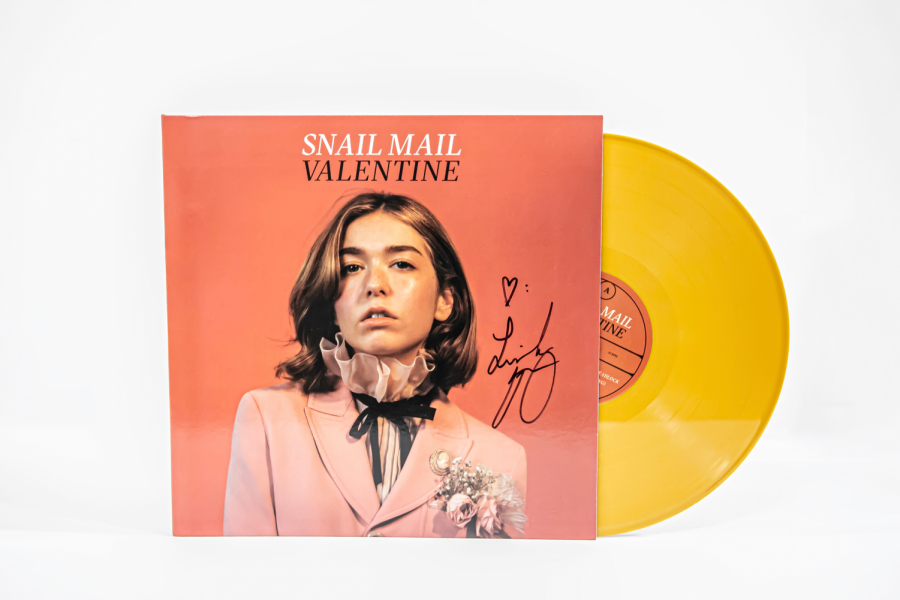Review: ‘Valentine’ is a dynamic move forward for Snail Mail
On her sophomore album, the indie-rock artist explores love and heartbreak with a more expansive palette.
Snail Mail’s sophomore album “Valentine” was released on Nov. 5. The album is a step forward that shows promise for Snail Mail’s future. (Staff Photo by Ryan Walker)
November 15, 2021
When Lindsay Jordan, who performs as Snail Mail, released “Lush” in 2018, she was met with rapturous critical acclaim. Jordan was only 18 at the time, but already felt industry pressure for her follow up release.
“Lush” deserved the hype. The album was some of the best indie rock I’ve heard in the past few years, featuring Jordan’s emotionally charged songwriting and fluid guitarwork, as well as a tight and energetic rhythm section. A self-described perfectionist, Jordan spent over a year in lockdown obsessing over the details of her sophomore album to make sure it held up to her previous work. Over three years later, the album, titled “Valentine,” is finally here.
“Valentine” opens with its title track and leadoff single, which is the album’s most energetic song. It blends the stripped back indie-trio sound of Snail Mail’s earlier music with more synths and production details. The song’s opening tricks you into thinking that Snail Mail may have gone all-in on synths, but you’re proven wrong in the chorus — jangly guitars and pounding drums crash under the frustrated question “Why’d you wanna erase me?”
The variety on this album is its biggest strength over its predecessor, which was admittedly a bit of a one-note record. While “Headlock” would fit right in on “Lush” with some slight production tweaks, “Ben Franklin” is more downbeat and groovy, whereas “Forever (Sailing)” has a yacht rock vibe.
Snail Mail also makes room for a few acoustic songs, although the results of this decision are mixed. I like that “Light Blue” is a moment where Jordan’s romance works out, making the song more than just a musical change of pace. On the other hand, the country-tinged “c. et al” is an album lowlight. The gravelly strain in Jordan’s voice does not fit the track, and it becomes distracting and even grating.
Despite occasionally clashing with the arrangements, Jordan’s unkempt, often strained delivery is a strength. While I can praise the album’s production, pacing and guitar playing, “Valentine” lives and dies by its emotional impact — which lives and dies through the lyrics and their delivery.
Jordan has always been an expressive vocalist with a way of making certain phrases really stick in listeners’ hearts. The album briefly explores the struggles of touring, moderate fame and even a stint in rehab, but the core of the album is about love and heartbreak. Every single song reminded me of how it feels to be in a failing relationship as I listened to the album.
The writing and singing are strong throughout, but standout lyrics for me include “I ruined me for you … I adore you” on “Valentine” and “Isn’t it strange / The way it’s just over / No late night calls / You’re not here to walk me to my door / Now I just love you more” on “Mia.”
“Mia” works well as a closing track, not just due its emotional weight but also because it provides an end to the album’s loose arc. On “Lush,” the line that stuck out was “I know myself and I’ll never love anyone else” from the song “Pristine.” But on “Mia,” Jordan comes to terms with moving on, singing “I love you forever / but I’ve gotta grow up now / I can’t keep holding on to you anymore.” It’s not necessarily a profound maturation, but it’s a step.
Whether or not it’s better than “Lush,” “Valentine” is different and fresh. While the pressure of following up an acclaimed debut has led many talented artists to create a weaker copy of their original, Jordan moved forward. The tighter song structures and synth embellishments will win over some and likely alienate others — that’s just a matter of personal taste. But “Valentine,” while not a perfect album, nails the delicate balance between familiarity and variety, making me excited for Snail Mail’s future.
A version of this story appeared in the Nov. 15, 2021, e-print edition. Contact Jack Solomon at [email protected].

























































































































































